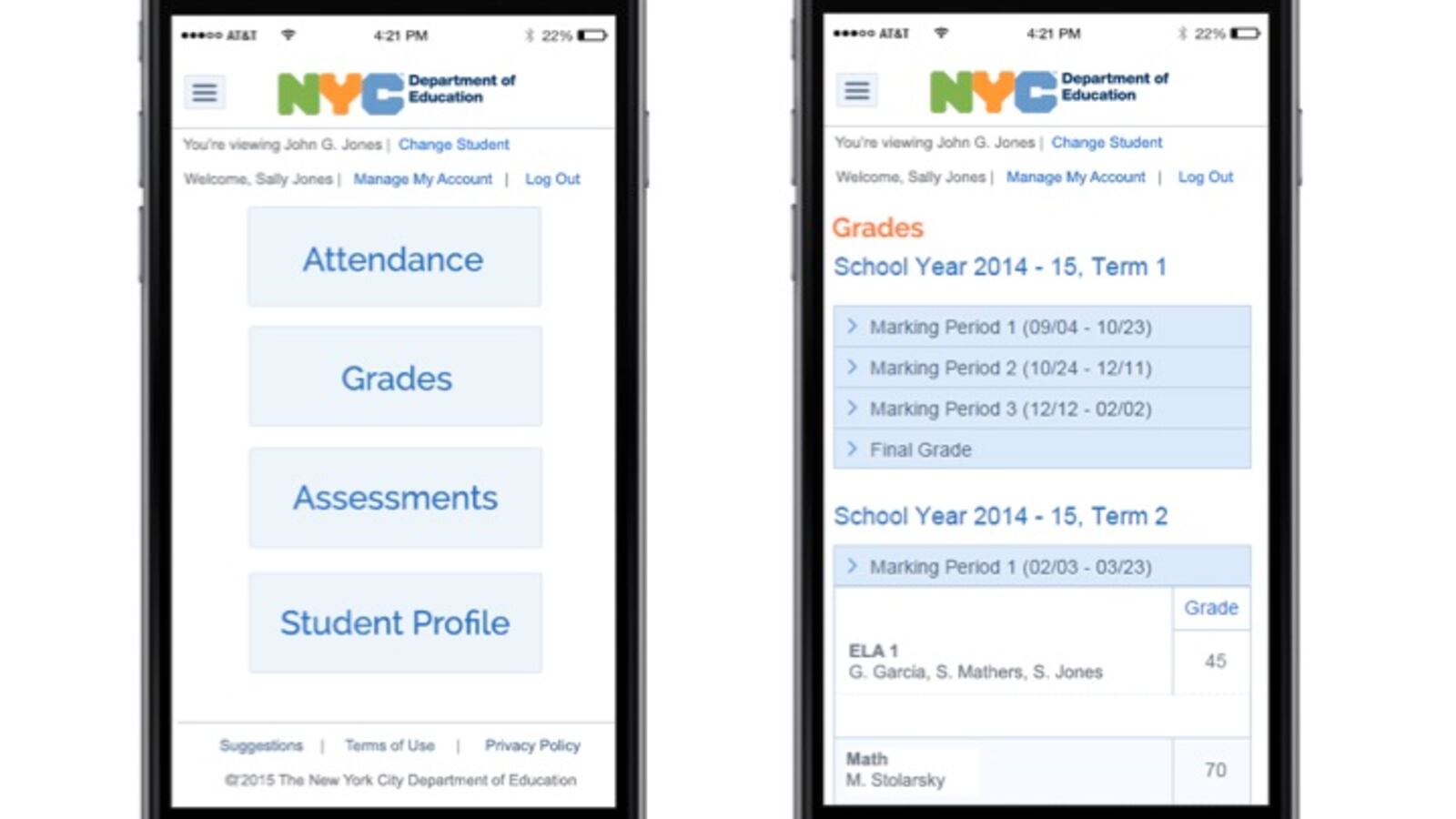Parents will soon have a new, mobile-friendly way to check up on their children’s progress in school.
The Department of Education has developed a website for parents that will replace parts of the defunct Achievement Reporting and Innovation System, or ARIS, a costly and unpopular data warehouse that had been in use since 2008. The new offering, called NYC Schools, is emblematic of the de Blasio administration’s approach to school and student data, which is focused on making the systems understandable to families, not evaluation.
Officials unveiled the system to reporters on Tuesday, which features a simple interface that officials touted as an improvement over ARIS’s more complicated set-up. Parents who log into their account this summer will be able to view their student’s report card grades and daily attendance for this school year. By August it will include class schedules and state test scores, and eventually will include historical data so that parents can track a child’s progress.
“We really started building a tool that was based on what parents asked for, which is simplified navigation, basic information that can be accessed quickly,” said Hal Friedlander, the department’s chief information officer who oversaw the project. Parents have to sign up at their child’s school, which will start registering parents on June 8.
Until December, all parents and teachers had access to basic information about their children through the ARIS system, which launched in 2008 under former Chancellor Joel Klein. Though glitches delayed its rollout, the system included big improvements to data storage for the nation’s largest school district, consolidating information that had been hosted in separate databases for decades. Previously, teachers had to use a variety of data systems to figure out which school their students used to attend, what their test scores were, or how often they missed class.
But the city’s more ambitious goal for ARIS — for its data to be used to improve teaching and learning — never quite materialized. Teachers complained that the data was too limited to guide their instruction, while parents complained that it was difficult to access and did not provide anything more valuable than what they got at parent-teacher conferences or on quarterly report cards. All told, the price tag reached $95 million for the project. In 2012-13, just 3 percent of parents and 16 percent of teachers had logged into ARIS, according to the city.
With participation rates low and maintenance contracts expiring, Fariña announced in November that the city would develop a replacement system internally.
Friedlander said the project is expected to cost no more than $6 million to develop and update over the next four years. The work was completed by developers on staff, who unlike outside contractors weren’t being paid by the hour.
“We’re not trying to make revenue on top of what our costs are,” Friedlander said.
The NYC Schools accounts will be competing with a host of online products that have cropped up in recent years — many in response to frustrations with ARIS — and which provide schools with extra features the city’s tool won’t include. PupilPath, for instance, keeps track of attendance and scores on class tests, and provides students with an instant messaging system to communicate with teachers. Engrade, other product now owned by McGraw-Hill, provides much of the same features.
“Delivery of information online to parents is becoming more commonplace in districts all across the country,” said Peter Bencivenga, president of CaseNEX and DataCation, the companies that developed PupilPath. That product has been used by more than 500 city schools, Bencivenga said.
As the de Blasio administration scraps systems developed by the Bloomberg administration, which used student data to build new accountability systems, officials have emphasized their focus on making that information more family-friendly. Last year, Fariña replaced school progress reports, which included A-F letter grades used to rank and evaluate schools, with “School Quality Snapshots” intended for parents and more detailed “School Quality Guides.”
The department is still working out the precise balance useful and overwhelming. Proposed overhauls of both the guides and the snapshots include more detail than last year’s versions. And some elements of the city’s Where Are They Now reports, which disappeared last year, have reemerged in new data tools developed for principals.
Officials said those tools will also allow teachers to view their students’ data soon, which is something that they haven’t been able to do as easily in the months since ARIS folded.
Some teachers say they have missed having that access since ARIS folded in December. Mark Anderson, a special education teacher in the Bronx, said he now has to retrieve data reports from his school’s secretary, who must print out raw data from another city system he cannot access on his own.
“Before, it took me one minute to pull it up on my laptop,” Anderson said.

